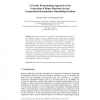Free Online Productivity Tools
i2Speak
i2Symbol
i2OCR
iTex2Img
iWeb2Print
iWeb2Shot
i2Type
iPdf2Split
iPdf2Merge
i2Bopomofo
i2Arabic
i2Style
i2Image
i2PDF
iLatex2Rtf
Sci2ools
EPIA
2007
Springer
2007
Springer
A Genetic Programming Approach to the Generation of Hyper-Heuristics for the Uncapacitated Examination Timetabling Problem
Research in the field of examination timetabling has developed in two directions. The first looks at applying various methodologies to induce examination timetables. The second takes an indirect approach to the problem and examines the generation of heuristics or combinations of heuristics, i.e. hyper-heuristics, to be used in the construction of examination timetables. The study presented in this paper focuses on the latter area. This paper presents a first attempt at using genetic programming for the evolution of hyper-heuristics for the uncapacitated examination timetabling problem. The system has been tested on 9 benchmark examination timetabling problems. Clash-free timetables were found for all 9 nine problems. Furthermore, the performance of the genetic programming system is comparable to, and in a number of cases has produced better quality timetables, than other search algorithms used to evolve hyper-heuristics for this set of problems.
| Added | 07 Jun 2010 |
| Updated | 07 Jun 2010 |
| Type | Conference |
| Year | 2007 |
| Where | EPIA |
| Authors | Nelishia Pillay, Wolfgang Banzhaf |
Comments (0)

